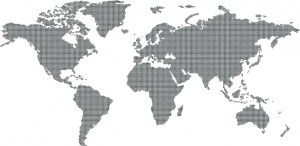 Karen Elliott House discussed Saudi Arabia?s $500 billion in oil reserves, 40 percent young adult unemployment and emerging questions with regard to gender and religious roles in Tuesday?s Pepperdine University School of Public Policy Charles and Rosemary Licata Lecture Series.
Karen Elliott House discussed Saudi Arabia?s $500 billion in oil reserves, 40 percent young adult unemployment and emerging questions with regard to gender and religious roles in Tuesday?s Pepperdine University School of Public Policy Charles and Rosemary Licata Lecture Series.
House is a Senior Fellow at the Belfer Center for Science and International Affairs at Harvard?s Kennedy School of Government, Pulitzer Prize winner for international reporting for coverage of the Middle East and was publisher of the Wall Street Journal from 2002 to 2006. She has also appeared on PBS, FOX, CNN and CNBC as an expert on international relations.
House spoke to graduate and undergraduate students alike about her time in Saudi Arabia. She went there with a purpose.
?When I retired from the [Wall Street] Journal in 2006, the one thing I was interested in doing with my new-found time was trying to understand Saudi society. What was the society like? How did they look at their rulers? How did they look at us??
House stated that her new book, ?On Saudi Arabia: Its People, Past Religion, Fault Line ? and Future,? focused more on the heart of Saudi society.
?Saudi Arabia is the strangest country you will never see,? she said. ?My goal was not to proscribe what Saudi Arabia ought to be like, but to try and understand what it was like.?
Beginning with the role of women in Saudi society, House said, ?She [a woman] is always in the control of some man; she cannot go to her son?s school; she cannot even see her son graduate.?
House spoke about other ideas that divide the country. ?The divisions are quite deep. In my view, it is divided by region, by religious sect, divided by gender, and people have a deep distrust of each other,? she said. ?It is more diverse than we in the west think; it is much more divided than we in the west realized and much more dependent on the government.?
In delving into the economic structure of Saudi Arabia, House talked about the vital importance oil plays in Saudi political all aspects of society. She pointed out that 90 percent of the treasury of Saudi Arabia comes from oil wealth and that Saudi Arabia has $500 billion in reserves.
House described Saudi oil, as not only an economic tool to fund subsidies and maintain economic stability for the country, but also as a political equalizer for the Saudi royal family. She said, ?Oil wealth buys, at least acquiescence, if not loyalty? for the King.
House also pointed out a crucial employment fact: ?Almost all Saudis are employed by the government,? she said, and ?90 percent of private sector employees are foreign.? These statistics, however, do not indicate a high level of employment: ?Unemployment for 20 to 24 year olds is 40 percent? and ?40 percent Saudis live on $1,000 a month,? according to House.
House described the Saudi religious environment as one in which religion is omnipresent: ?Every university, every shopping mall, every airport, has prayer rugs in the direction of Mecca properly pointed so that everyone prays in the proper times. The shopping malls close. Everyone goes to pray.?
She also summed up the relationship between religion and gender roles:
?Men obey Allah, and women obey men, and Allah is distant and men are at hand.?
However, new technologies such as the Internet and cable television have taught young Saudis to question and to communicate. This is a very new thing in Saudi Arabia, according to House.
?This newfound information, that young people and old people have access to, is eroding the credibility of the religious establishment, which is increasingly seen by religious people as doing the will of King Abdullah, not the will of Allah.?
House also discussed the King Abdullah University of Science and Technology: ?The King Abdullah University of Science and Technology, not only mixes Saudi men and women, but also infidel men and women all over the world.?
She said this move has produced backlash from many senior religious figures and fundamentalist Wahhabis (the particular form of Islam practiced in Saudi Arabia).
?When one of the 20 senior religious scholars was asked about the appropriateness of this [formation of the university] on TV. He said it was wrong, and the King fired him because the King appoints these 20 people.?
The tug of war between a monarchy that is seeking to slowly modernize the nation, people who are looking for more equality and the Wahhabi religious leaders is ever present in all aspects of daily life said House.
?[Saudis want] simply a government that is more transparent, more accountable, more rule of law, with clear rules and enforced equally,? House said. ?In a post-Arab Spring environment, government is not inclined to take things from people.?
????????????????????????????????????????????????????-
Follow the Graphic on Twitter: @PeppGraphic
Source: http://www.pepperdine-graphic.com/news/specialist-expounds-on-saudi-society/
News Ryan Lanza Facebook usa today foxnews yahoo news cnn news Connecticut shooting
No comments:
Post a Comment
Note: Only a member of this blog may post a comment.